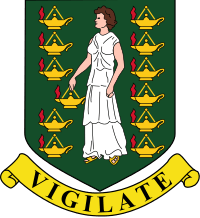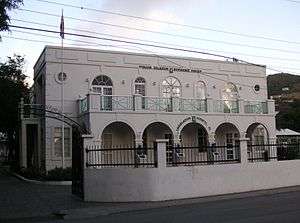Politics of the British Virgin Islands
 |
| This article is part of a series on the politics and government of the British Virgin Islands |
Politics of the British Virgin Islands takes place in a framework of a parliamentary representative democratic dependency, whereby the Premier is the head of government, and of a multi-party system. The British Virgin Islands (officially the "Virgin Islands") are an internally self-governing overseas territory of the United Kingdom. The United Nations Committee on Decolonization includes the islands on the United Nations list of Non-Self-Governing Territories. The Constitution of the Islands was introduced in 1971 and amended in 1979, 1982, 1991, 1994, 2000 and 2007. Executive power is exercised by the government. Legislative power is vested in both the government and the House of Assembly. The Judiciary is independent of the executive and the legislature. Military defence is the responsibility of the United Kingdom.
A new constitution was made in 2007 (the Virgin Islands Constitution Order 2007) and came into force after the Legislative Council (the former name of the House of Assembly) was dissolved for the 2007 general election.
Executive branch
| Office | Name | Party | Since |
|---|---|---|---|
| Queen | Elizabeth II | 6 February 1952 | |
| Governor | John Duncan | 15 August 2014 | |
| Premier | D. Orlando Smith | NDP | 9 November 2011 |
The Governor is appointed by the Monarch. The Premier (formerly Chief Minister) is appointed by the Governor from among the members of the Legislative Council, and is by parliamentary convention the leader of the party holding the largest number of seats.
The Cabinet (formerly named the Executive Council) is appointed by the Governor upon the advice of the Premier from amongst the elected members of the House of Assembly.
Legislative branch

The British Virgin Islands elects on territorial level a legislature. The House of Assembly (formerly Legislative Council) has 15 members, 13 members elected for a four-year term, 9 of them in single-seat constituencies and 4 at large, one ex officio member and one speaker chosen from outside the council.
| Parties | Votes* | %age | Seats |
|---|---|---|---|
| National Democratic Party | 27,070 | 60.2% | 11 |
| Virgin Islands Party | 13,601 | 30.2% | 2 |
| People's Empowerment Party | 1,786 | 4.0% | 0 |
| People's Coalition Movement | 307 | 0.7% | 0 |
| Independents | 2,226 | 4.9% | 0 |
| Speaker and Attorney General | 2 | ||
| Total (turnout --% (est.)) | 44,990 | 100.0% | 15 |
| * Each voter has 5 votes; 1 district vote and 4 territorial "at-large" votes | |||
| Source: Deputy Governor's Office | |||
"At large" seats
The 4 at large seats are a comparatively recent innovation in British Virgin Islands politics. They were introduced under some pressure from the British Foreign and Commonwealth Office in the mid-1990s. The rationale behind their introduction was that there was a risk that constituency seats can become too closely tied to a particular local figure, and that if a certain number of local figures join the same political party, then the voters have no real choice in selection of their government. Under the proposals any person in the Territory could stand as an at large candidate, and each voter would have four at large votes in addition to their constituency vote. The four at large candidates who received the highest total number of votes would be elected to the Legislative Council.
The proposals were strongly opposed by Lavity Stoutt, the Chief Minister of the day; he arranged for the entire Territory to be polled to ascertain how the voters felt about new rules being "foisted" upon them by the FCO in London,[nb 1] and then later flew to London with an entire delegation (including the Attorney General) to try to dissuade them. Despite this opposition the at large seats were introduced.
Although Lavity Stoutt died shortly after the first election with at large seats in 1995, his fears proved to be well founded. Although his Virgin Islands Party was returned to power in 1995, and retained power in the following election under the leadership of Ralph T. O'Neal in 1999, the at-large seats have since become a stronghold for the opposition National Democratic Party.
List of Members
| Name | Party | Member of | First elected | Title | Previous Roles | Constituency |
|---|---|---|---|---|---|---|
| Dr D. Orlando Smith OBE, MD | NDP | Government | 1999-present | Premier, Minister of Finance and Tourism | Chief Minister | Territorial At-Large |
| Myron Walwyn | NDP | Government | 2011-present | Minister for Education and Culture | Territorial At-Large | |
| Ronnie Skelton | NDP | Government | 2003-2007 and 2011-present | Minister of Health and Social Development | Territorial At-Large | |
| Archibald Christian | NDP | Government | 2011-present | Government Backbencher | Territorial At-Large | |
| Andrew Fahie | VIP | Opposition | 1999-present | First District | ||
| Melvin Turnbull | NDP | Government | 2015-present | Second District | ||
| Julian Fraser | VIP | Opposition | 1999-present | Deputy Chief Minister and Minister for Communications and Works and Minister for Natural Resources and Labour | Third District | |
| Mark Vanterpool | NDP | Government | 2003-2007 and 2011-present | Minister for Communications and Works | Fourth District | |
| Delores Christopher | NDP | Government | 2011-present | Government Backbencher | Fifth District | |
| Alvera Maduro-Caines | NDP | Government | 2011-present | Government Backbencher | Sixth District | |
| Kedrick Pickering | NDP | Government | 1999-present | Deputy Premier, Minister for Natural Resources and Labour | Seventh District | |
| Marlon Penn | NDP | Government | 2011-present | Government Backbencher | Eighth District | |
| Hubert O'Neal | NDP | Government | 2015-present | Ninth District | ||
| Ingrid A. Moses-Scatliffe | None | Independent | 2011-present | Speaker of the House | Appointed | |
| Baba Azziz | None | Independent | 2015-present | Attorney General | Appointed |
Political parties and elections
The two main political parties in the British Virgin Islands at present at the Virgin Islands Party (VIP) and the National Democratic Party (NDP). The only parties other than the VIP and the NDP which has ever won power at a general election in the British Virgin Islands is the now defunct United Party, which won the 1967, 1975 and 1983 general elections, and the now defunct VI Democratic Party, which won the 1971 general election as part of a coalition government.
Political parties in the British Virgin Islands are not generally formed on an ideological basis, and do not normally affiliate themselves with a political school of thought. Political parties do not identify themselves are being on the political right or the political left. Similarly parties do not normally identify themselves with mainstream political movement such as green politics. Although there are no religious parties in the British Virgin Islands, all parties typically identify themselves with Christianity. Most parties campaign on a concepts with close affinity to nationalism, and core competency in relation to administration of Government. Because of the high numbers of economic migrants in the British Virgin Islands, much political campaigning has a xenophobic tinge to it,[1] and often focuses on political patronage for BVIslanders.[2]
Crossing the floor
There is relatively little party loyalty in the British Virgin Islands (which may be reflective of the lack of party ideology), and most significant elected politicians have changed party allegiance at least once, and sometimes more frequently, during their careers. Notable politicians who have switched parties include:
| Politician | Details |
|---|---|
| Lavity Stoutt | Former Chief Minister. Founded the United Party in 1967 and contested the 1967 general election. In 1971 left the United Party to form the Virgin Islands Party. |
| Terrance B. Lettsome | Former Minister. Member of the United Party in 1967 and contested the 1967 general election. In 1971 left the United Party to form the Virgin Islands Party. |
| Q.W. Osborne | Former Minister and Leader of the Opposition. Founded the VI Democratic Party, and served as Leader of the Opposition and Minister for Natural Resources and Public Health. Left the party in 1972 and joined the Virgin Islands Party to contest the 1975 general election. Subsequently left and re-joined the VI Democratic Party. |
| Willard Wheatley | Former Chief Minister. Won the 1971 general election in a coalition with the VI Democratic Party. Left the VI Democratic Party to join United Party and led them to general election victory in 1975. In 1990 left the United Party to form the Progressive People's Democratic Party. |
| Ralph T. O'Neal | Former Chief Minister and Premier. Contested the 1971 general election on behalf of the VI Democratic Party. Subsequently ran as an independent before joining the Virgin Islands Party in 1983. Left and joined the United Party for the 1986 general election and served as leader of the opposition. Left the United Party in 1988 to rejoin the Virgin Islands Party for a ministerial seat. |
| Oliver Cills | Former Minister. Contested the 1971 and 1975 general elections on behalf of the VI Democratic Party and served as party leader and leader of the opposition after the death of Austin Henley. Subsequently joined the Virgin Islands Party and contested the 1986, 1990 and 1995 elections on behalf of the Virgin Islands Party. |
| Alvin Christopher | Former Minister. Initially elected as an independent. Joined the Virgin Islands Party for a ministerial seat. Left the Virgin Islands Party and joined the National Democratic Party. Left the National Democratic Party and rejoined the Virgin Islands Party. Left the Virgin Islands Party to form the People's Empowerment Party. |
| Eileene L. Parsons | Former Minister. Initially elected as an independent. Joined the Virgin Islands Party for a ministerial seat. Left the Virgin Islands Party in July 2000 and joined the National Democratic Party. |
| Omar Hodge | Former Minister. Initially ran as an independent. Joined the Virgin Islands Party in 2001. Left the Virgin Islands Party in 1988 and contested the 1990 election for the Independent People's Movement. Rejoined the Virgin Islands Party prior to the 1995 election. |
| Mark Vanterpool | Minister for Communication and Works. Initially elected as a member of National Democratic Party in 1999. Joined the Virgin Islands Party in 2001. Left the Virgin Islands Party in 2007 and re-joined the National Democratic Party. |
Judicial branch
The British Virgin Islands is a member state of the Eastern Caribbean Supreme Court. Judges in the British Virgin Islands are appointed rather than elected politically. By convention, judges on the Eastern Caribbean are always appointed to sit outside of the jurisdiction they are from to minimise the possibility of political interference with the judiciary.
International organization participation
Caricom (associate), CDB, ECLAC (associate), Interpol (subbureau), IOC, OECS (associate), UNESCO (associate)
Notes
- ↑ The results of the poll were largely inconclusive. Voters were asked if they would prefer (i) to have at large seats introduced, (ii) prefer not to have at large seats introduced, or (iii) no preference. The votes were almost equally split into thirds, but the largest proportion of the votes was in favour of introducing at large seats. Nonetheless, Lavity Stoutt cited the poll as an indication that over half the population either did not want change, or had no preference, and thus constitutional change was inappropriate.
Footnotes
- ↑ "New party cautions foreign investors, says it will not recognize any water right". BVI News. 31 March 2014.
- ↑ "If outsiders can get land, our people should also get many acres – O'Neal". BVI News. 15 April 2014.
.svg.png)